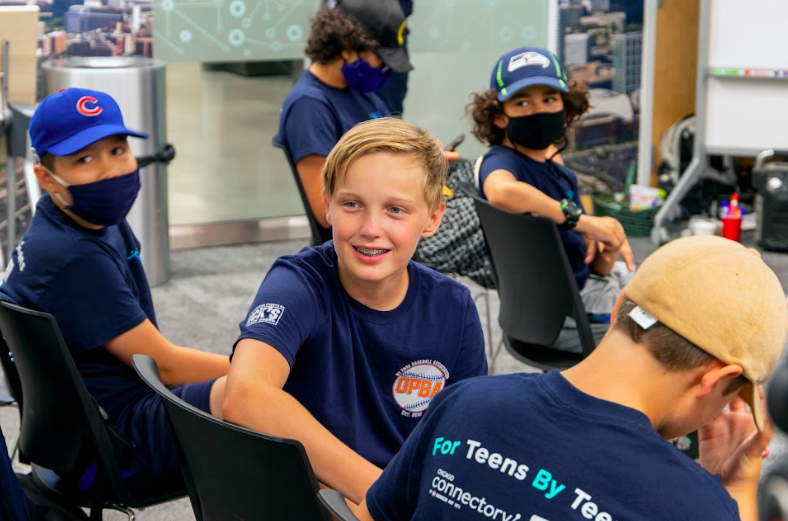Of the many things you can provide your children, a sense of community may be among the most important gifts they receive. Social connectedness is extremely important for mental wellbeing and longevity. In fact, According to Tal Ben-Shahar, a lecturer at Columbia University and author of seven books on happiness, “the number one predictor of happiness is the time we spend with people we care about and who care about us.” So if the time spent with friends is so crucial, it makes sense to make friends that support one’s well-being, too.
Recent CDC findings published in Pediatrics show that a sense of belonging among youth also has effects lasting into adulthood, stating that “youth who feel connected at school and at home were found to be as much as 66% less likely to experience health risk behaviors related to sexual health, substance use, violence, and mental health in adulthood.” That’s a powerful statistic, yet perhaps not surprising. If the pandemic has taught us anything, it’s how much we humans want to connect with one another.
Living through isolation during the COVID-19 pandemic made the importance of connection and belonging increasingly obvious. Compared with 2019, the proportion of mental health–related hospital visits for children aged 5–11 and 12–17 years increased approximately 24%. and 31%, respectively. But there is hope for improvement, as schools reopen and students again have more interaction with classmates and teachers.
The question for many of our kids remains, are they feeling connected with their “right tribe”? Especially if your teen is ‘different’, gifted, more inquisitive, or learns differently, they may have more of a challenge in finding and making like-minded friends. Even though you can’t control your child’s internal sense of belonging, there are a few ways you can encourage your child to access it. Here are 3 of our top recommendations.
- Branch out. Talk up opportunities to meet and expand your teen’s friend groups. While school classes are the likely venue to establish new friendships, there are other settings like clubs, sports, and classes offered in your local community. Even if your child believes she is ‘not athletic,’ park district sports teams are often a low-pressure way to gain new skills and new friends. Encourage kids to think about these opportunities like a new adventure. Something to try for one session, and then decide if it’s not for them. New connections and friends made outside of your school environment can also make the transition into middle school or high school smoother for your teen.
- Be authentic. Let your child know that being real means being willing to be seen as you are, without changing yourself for pleasing or performing for others. Even though to many young teens, “fitting in” may seem of paramount importance, altering your true self in order to feel comfortable in a group is not true belonging. It’s actually hiding. Authenticity – being who you are so that your insides match your outsides – is essential to that sense of connection and belonging that we’re discussing here.
- Be Brave. Bravery is a skill. Lots of teens (and adults!) have trouble motivating themselves to do things that feel scary. And starting conversations with potential new friends can be just that. But what do they have to lose, other than two awkward minutes at worst? What’s to gain? Could be a friend for life. Encourage your teen to listen to their gut about who they have something in common with. Those are the people to try connecting with first. Talk with your teen and come up with 5 questions they can use as conversation starters. (Questions are great, because people love to talk about themselves!) Think of it as helping your teen prepare a toolbox that he can pull from when needed. Once they get the hang of it, starting conversations will become much more natural.
If you’re reading this, I know you want the best for your kids. But like most of us, sometimes you may feel too busy or tapped yourself to provide the attention your kids need to live their best lives. At Teen Innovators, we provide support by making vital connections between young teens and near-peer mentors, who provide constructive, social support, and positively influence their lives. Mentor sessions are available on-demand and virtual, so students can login from anywhere!
We strive to create a sense of belonging. Through our work with many younger teens, we’ve learned that what unites them is a desire for community, a safe space to engage, socialize, and feel heard and validated. Our mentors get it. Either high school seniors or recent high school graduates, these are accomplished young adults with fresh experiences that teens can learn from and relate with.
This fall, we are launching virtual after-school clubs, led by our stellar peer mentors. In this new format, we’re providing young teens a space where they can connect with caring older peers, as well as with like-minded young teens from across the country. Up first? Video Game Like a Pro by playing Minecraft and Fortnite. Also on the schedule are Explorer’s Club, in which students will virtually explore a new city at each meeting, and Animals Club, where students will learn how to care for their pets and favorite animals, as well as learn about potential careers in animal-related fields. Coming soon are Author’s Club for teens who feel inspired to write a book, and Be Your Own Boss Club, for budding entrepreneurs. While our clubs offer something for everyone, belonging is the universal side benefit that keeps on giving.
To your success,
Christine Hutchison, Founder
Teen Innovators strives to improve students’ social and mental well being, Teen Innovators provides after school near peer mentoring sessions and clubs that foster creative thinking and purpose driven conversations to build leadership and life skills helping teens to feel more confident, energized, and motivated.
Our peer mentors are highly-accomplished older teens and young adults age 17-21, who are passionate about sharing their knowledge with their younger peers. Now offering virtual clubs! Explore our programs at Teeninnovators.com.





